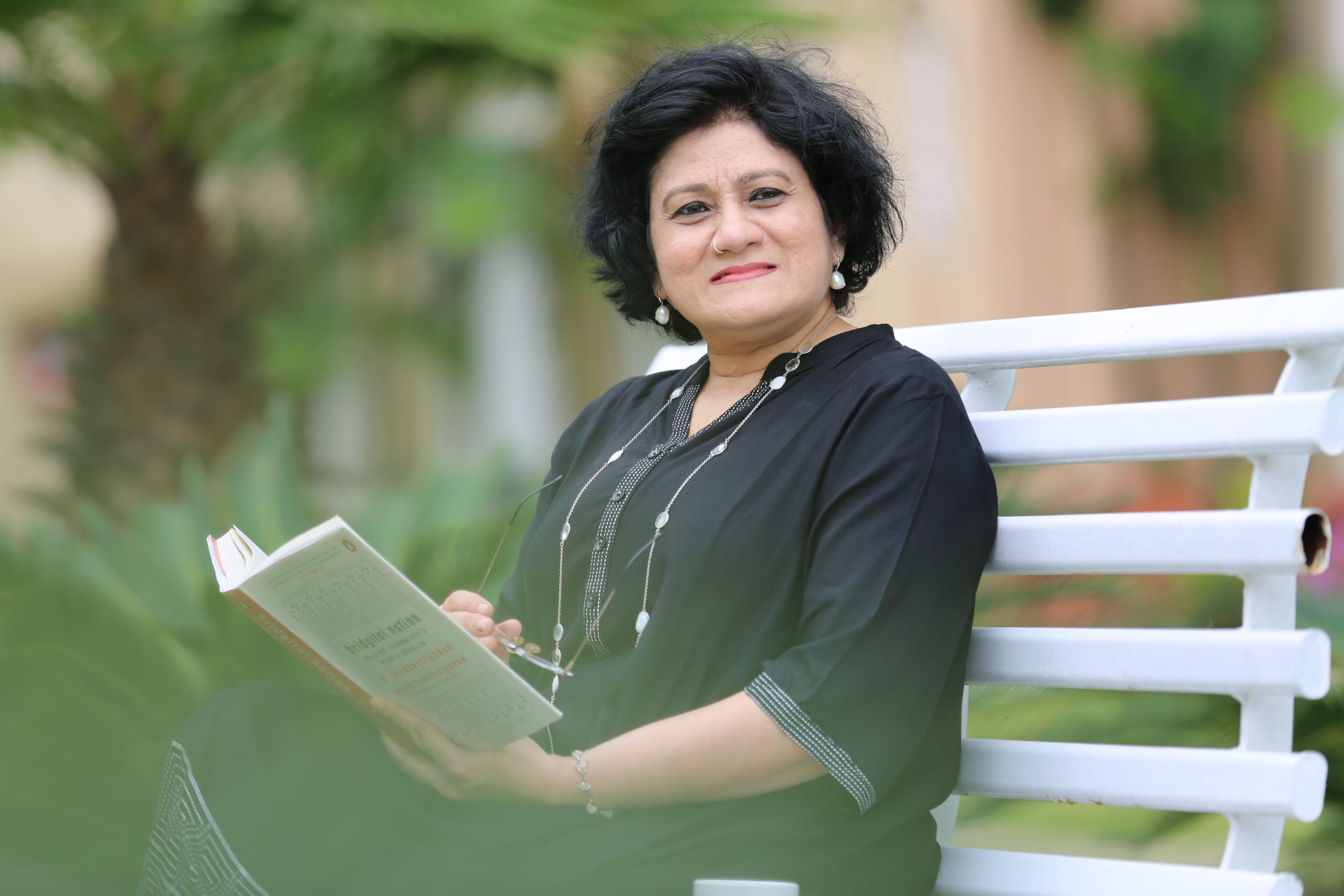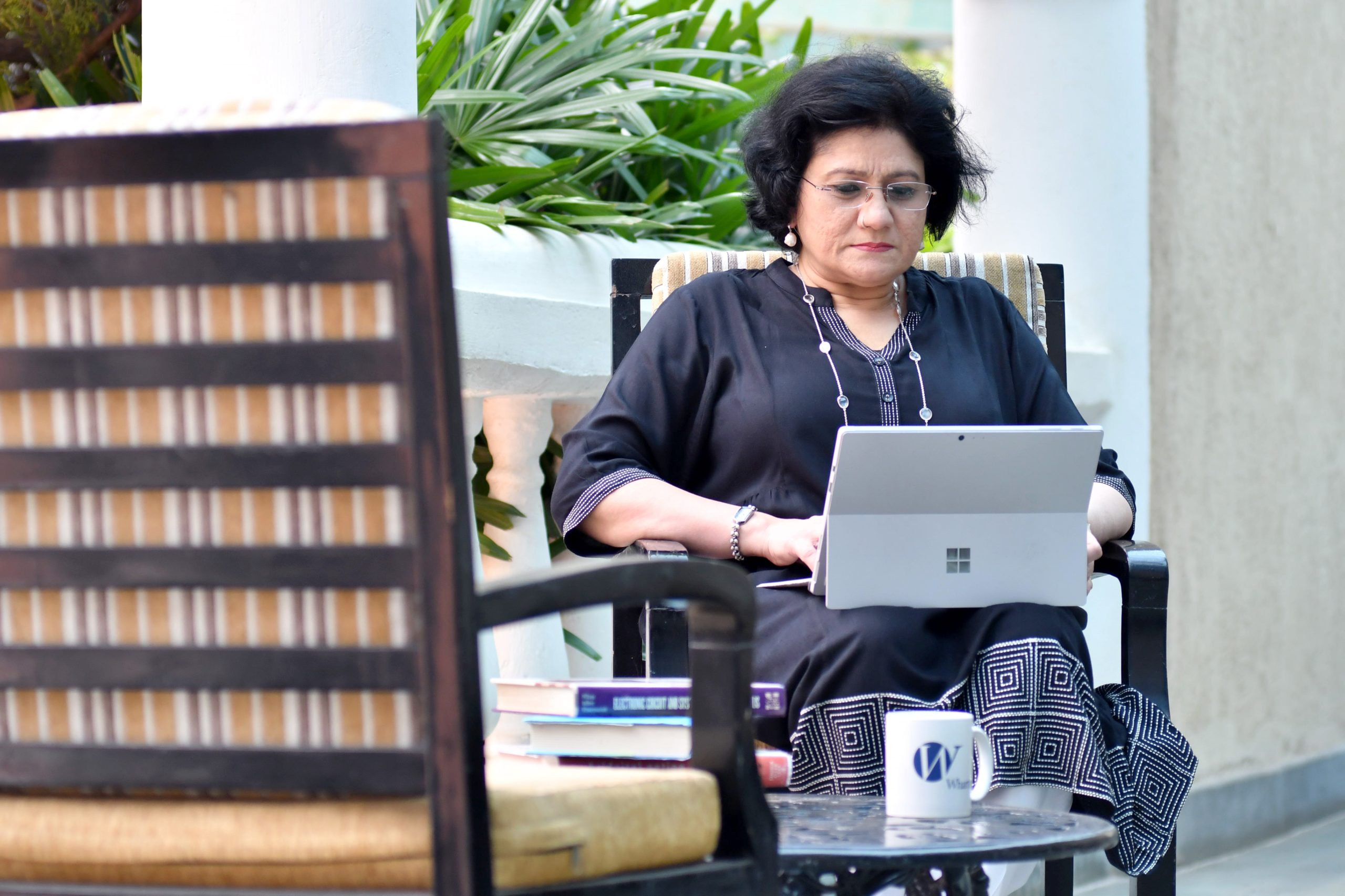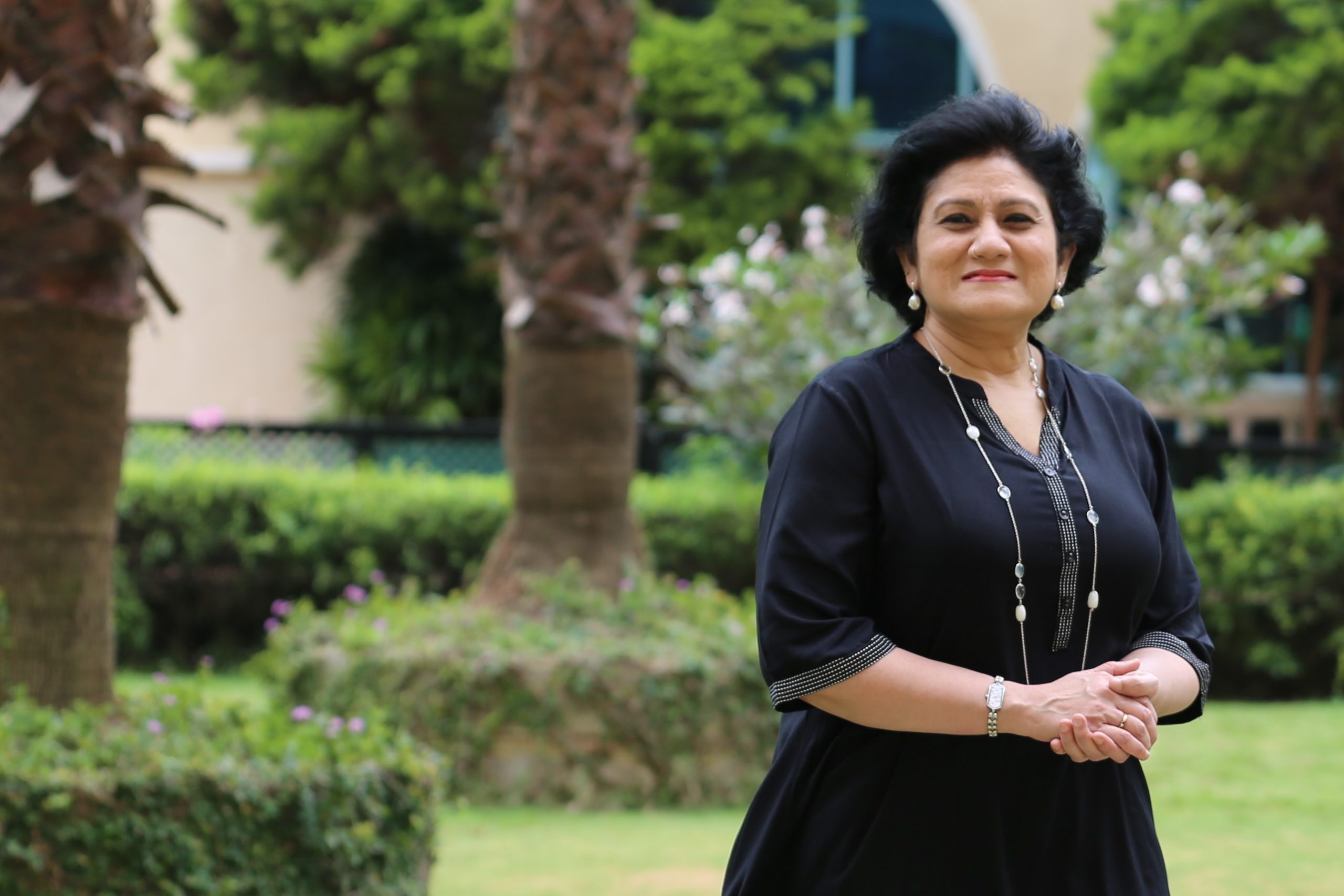
People of Microsoft Asia
Technical curiosity with a philosophical bent
Microsoft India’s National Technology Officer talks about life, ethics, the future, and the power of diversity and inclusion.
Rohini Srivathsa was a sixth-grader when she saw a computer for the first time. “I was little, and it was big,” she recalls. “It was programmed using old-style punch cards. It was nothing like the PCs of today, but I was fascinated.”
The massive machine had been proudly installed at the Indian Army base where her father was an officer in the Electronics and Mechanical Engineers Corps. He showed her how the computer ran a simulator that taught soldiers how to operate a tank.
“I climbed up into the driver’s seat, and it felt like I was moving over real terrain. It was fantastic.” Wonder and excitement can still be heard in her voice as she recounts that formative brush with technology.
In the years that followed, she pursued a top-class STEM (science, mathematics, engineering, and technology) education and built a high-powered international career.
Now Dr. Srivathsa is National Technology Officer at Microsoft India. She is also a member of the Sensitive Uses Working Group of Microsoft’s AETHER (AI and Ethics in Engineering and Research) Committee. AETHER is a group of global thought leaders who advise Microsoft’s top leadership on the challenges and opportunities presented by AI innovations.
We recently spoke with her about her influences, work, passions, and hopes.
Where are you from in India?
I was born in the city of Agra, which is home to the Taj Mahal. My father is a retired officer in the Indian Army. We lived all over the country during my childhood. Growing up in so many different places meant I got to know and respect all sorts of people.
What part of the country someone comes from, what language they speak, what food they eat, what religion they follow are all quite irrelevant when you grow up in an army environment. I developed a strong sense of identity with the whole of India. That’s one reason why being Microsoft India’s National Technology Officer is so important to me.
We will talk about your current role later. But first, tell us more about the influences from your childhood.
My dad is a quintessential engineer. In our house, there was always something or other that he had dismantled. He was trying to enhance it, or repair it, or he was creating something completely different. One time he used bits and pieces of an old-style gramophone record player and a radio with vacuum tubes to make his own stereo sound system. He was constantly figuring out how things worked.
He was also a master storyteller. My sister and I would go with him to the ruins of an old fortress as kids. He would help us imagine what it must have looked like 500 years ago: where the cannons might have been placed, where the cooking was done, where royalty might have stayed. He had a great imagination that went beyond the technical. He gave me a sense of curiosity about the world.
My mom did too. She is a scholar of Sanskrit (an ancient Indian language and script). She has a Ph.D. in Sanskrit, which is deeply embedded in our culture and values. So, I guess I got my technical curiosity from my father and my societal and philosophical bent from my mother.
Tell us about your early interest in STEM subjects.
A lot was going on at the time in India. The country was developing, and engineering was a sort of default option when I started my undergraduate degree. I was encouraged by my dad to go beyond the curriculum on campus. So, I visited a lot of R&D centers and small-to-medium enterprise factories.
I got a real sense of the big world of engineering in those days. At first, I was interested in instrumentation, which today we would call the world of IoT. Sensors and actuators, and control systems – these really caught my imagination.
After I got my undergraduate degree here in India, I went to the U.S. for my master’s and Ph.D. at the University of Texas at Austin. Initially, I studied control systems. From there, I went into semiconductors. There is a lot of math and physics involved in both areas.
I began to look at the design of semiconductors at very tiny scales, what they call deep sub-micron designs. After that, I transitioned from looking at why and how things worked to taking up a more analytical way of thinking.
What was it like being a woman doing this type of study and then taking up a tech career?
In my undergrad course, around 20% of the students were women. That was considered a pretty good number at that time. At grad school at U.T. Austin, maybe 5% to 10% were women.
My Ph.D. adviser and my manager in my first job were both amazingly inclusive leaders. And while they were both men, they were feminists in many ways. I am still friends with both — almost 25 years later. My early career years were extremely fortunate. I felt very supported, encouraged, and included. I was a high performer, and I was recognized for it.
I was still in my first job as a researcher when I had my first baby. It is a big milestone for any woman. You go from a high-performing career-focused person to a new role as a mom. My boss and I discussed when I would restart work, how I would contribute, how my role would evolve, my responsibilities and so on.
There was no sense of me becoming less important. I felt very supported, secure and confident. My manager was an anchor for me during those years. I think all genders need coaching. We all need the confidence to take risks and feel that your boss and colleagues have your back. Mentorship is so important.
You are a mentor nowadays. So, what is your advice for today’s young women?
STEM is not just important; it is also full of opportunities. Let’s think of demand and supply. The world will be more and more digital with higher tech intensity. Every industry, not just tech industries, are going to need people with technology skills. The demand will continue to increase.
But when we look at the supply side, there are reasons for concern. Women, as half of the population, can play a huge role in making sure that this demand and supply situation works.
There’s also another side to a career in technology. A lot of roles in tech play to a woman’s strengths: being able to communicate across boundaries, openness to flexibility, and being able to multitask. In a lot of ways, practical inclusion can be inherently built into the technology sector.
What do you look for in a boss or a leader?
Through the years, I have consciously sought out bosses and colleagues who are open to different ideas and are secure about getting ideas from a strong personality like me. Not all leaders are like that. Some have not internalized the reality that they won’t always hear something they would like to hear!
There are three other qualities that I broadly look for in a leader. One, they must demonstrate a sense of purpose for their team. Leaders must inspire people at the heart level. The second is integrity. It is about transparency, consistency, fairness and accountability. Will you do the right thing whether or not someone is watching? Are you going to stand by what you believe in, even when the stakes are high?
The third one is empathy. As a technologist, who is also an analytically driven person, I have come to realize the importance of empathy. Over the last 10 or so years, I have consciously invested in life coaching to develop my own growth in that dimension: having empathy and the ability to connect with people with compassion.
How has your career and outlook evolved over the years?
The first decade of my career was very technical in its focus. I was a research kind of person then. I wrote a lot of technical papers and got published.
Then came my reinvention. I was technically strong, but I started to recognize a need to understand the big picture. That is, how to take technical advances and create an impact in the real world.
So, I went back to school and did an MBA at Wharton (at the University of Pennsylvania.) I went into consulting and worked in a range of roles. Nowadays, I am focused on issues like responsible AI, ethics, and policy.
That brings us to your current role at Microsoft. Can you explain what a National Technology Officer does?
My role involves thinking about the next generation of technology – emerging topics that are beyond our current horizon. How will these impact not only our business and our customers, but also society as a whole? It is a technology-specific role with a national circle of concern.
I look at how Microsoft can help my country achieve its potential. How it can empower people, communities, and governments. The effects of technology go well beyond business. They impact individuals and society as well.
Tell us about your work as part of the Sensitive Uses Working Group of AETHER?
We look at the challenges that AI innovations can bring across the globe. It’s a matter of not just asking what AI can do, but what AI should do. There are situations when we need to pause and think about where we are heading and the consequences.
We have laid out six ethical principles for AI: fairness; reliability and safety; privacy and security; inclusiveness; transparency; and accountability.
By holding these principles up like a mirror, we set standards for the company and guidelines for our customers and partners.
Why did you join this group?
I was asked to join the effort and at first I declined. I believed I had just too much on my plate with all my other responsibilities. But then, the following weekend, I watched a documentary about how technology was used to interfere with the (2016) U.S. elections.
It made me realize that I had to contribute. It was just too important. Sometimes serendipity makes you realize that your day job is not enough. You are being called to do something that is above and beyond. And you must rise to the opportunity, no matter what.
You work across India, which is a massive and diverse nation. How important is it for Microsoft to pursue policies of diversity and inclusiveness globally?
Our mission is to empower every person and every organization on the planet to achieve more. To empower people, you need to have some understanding of their perceptions and backgrounds.
So, we need diversity and inclusion in our company to really have a shot at carrying out our mission. We also need to be inclusive. I am a pretty bold person, and I do speak my mind. It is not just a gender thing.
But as a woman, perhaps, and also as a former strategy consultant, I am pretty perceptive about what is happening in a room or in a team. Are people stressed? Are people getting on each other’s nerves? Or is somebody feeling that they are not being included? You must care and be courageous about calling that out.


















